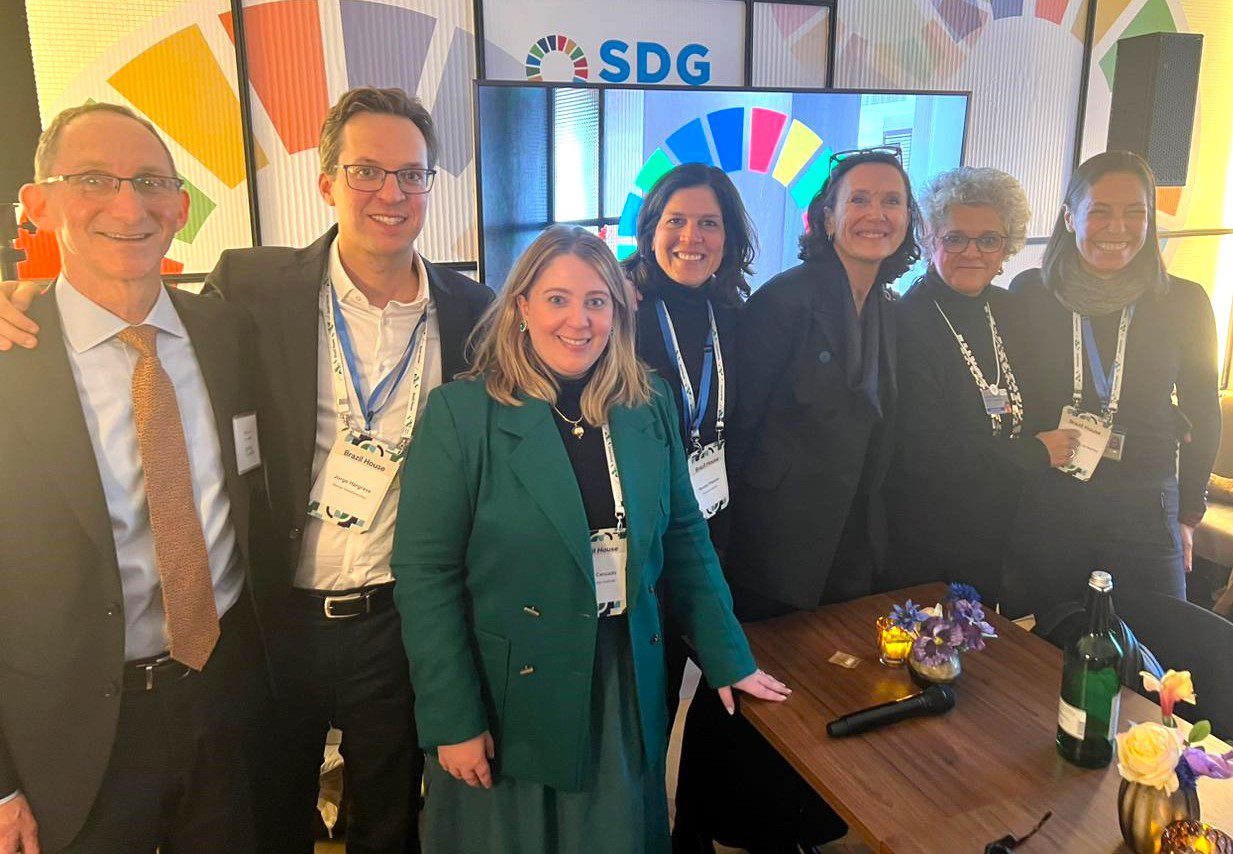
Placing Brazil at the center of the debate on Nature-Based Solutions (NbS). It was with this objective that the Arapyaú Institute embarked to the World Economic Forum in Davos, Switzerland, held from January 20 to 24. For some years, the leaders participating in the world’s main economic event have also been discussing how to deal with the biggest and most urgent crises: the climate crisis. And this year, Arapyaú joined the Climate and Society Institute (iCS), the Brazil Climate Institute platform (BCI), Capital for Climate (climate financing platform), the Climate Hub forum (Columbia Global Rio), and re.green (forest restoration company) to show that nature can be an alternative for development.
As about 55% of the world’s GDP depends moderately or highly on nature (PwC data), it is necessary for much more funding to be shifted from activities that harm nature to those that conserve it. The United Nations Environment Programme estimates that annual investments in nature-based solutions need to increase from US$ 200 billion to US$ 542 billion by 2030 to address the planet’s climate, biodiversity, and soil degradation crises.
“The World Economic Forum has been discussing the topic of NbS in recent years, but not from the Brazilian perspective. And the group’s idea was to present Brazil as an important provider of this type of solution,” explains Renata Piazzon, general director of the Arapyaú Institute.
This debate is even more strategic in 2025, when we celebrate a decade of the Paris Agreement and COP 30, which will take place in the heart of the Amazon, highlighting the intrinsic connection between nature and climate. Holding the meeting in Belém, Pará, emphasizes the crucial role of ecosystems like the Amazon in global climate solutions, paving the way for urgent discussions about the future of our planet, especially in a context of regional conflicts and political transitions.
The results of the last COP in Baku, which did not meet expectations for robust climate financing, further reinforce the need for collaboration on the issue, decisive leadership, and bold commitments in Belém. “As the conference host, Brazil will be at the center of multilateral negotiations, working to establish crucial agreements, boost more ambitious climate goals, and highlight important priorities such as NbS, adaptation, and just transitions,” says Renata.
This was one of the arguments presented at the “COP 30 in Brazil” panel on the 21st in Davos. Moderated by the general director of Arapyaú and Marina Cançado, co-founder of BCI, the meeting brought together names like Izabella Teixeira, former Minister of the Environment and Arapyaú fellow; Maria Netto, executive director of iCS; and Tony Lent, CEO of Capital for Climate, to discuss the context, critical milestones towards Belém 2025, and the main expected results. On the same day, in Brazil, the long-awaited announcement was made by André Corrêa do Lago, Secretary for Climate, Energy, and Environment at Itamaraty, as president of COP 30.
“Brazil has a rich menu of nature-based solutions, which already show effective impacts in addressing climate change. Forest restoration, for example, is the natural path to consolidating a nature-based economy. The fact that there is almost a France worth of abandoned land in the region can turn Brazil into an environmental powerhouse,” defends Renata.
This was the theme of another panel in Davos on the 22nd, with the participation of scientist Carlos Nobre, re.green CEO Thiago Picolo, and Naomi Morenzoni, vice president of the software company Salesforce. Forest restoration plays a crucial role in addressing the climate crisis, improving soil and water quality, protecting biodiversity; and the country is one of the leading global references in this science, as well as one of the priority regions for ecological restoration in the world. The activity can mitigate from 0.15 to 0.5 gigatonnes of CO2 per year by 2030, generating up to US$ 50 billion in revenues in Brazil, and is a key factor for a global net zero emissions economy.
By traditional accounting methods, a forest only has monetary value when it is cut down. That’s why the group formed by Arapyaú and partners is part of an effort to assign economic value to nature. A fundamental tool in this equation, technology – and its potential to map biodiversity and drive bioeconomies in the Amazon – was also on the agenda in Davos, in a conversation between Renata, Carlos Nobre, and Tasso Azevedo, coordinator of MapBiomas, on the 23rd.
All this mobilization at the World Economic Forum was another opportunity to turn debate into action. With collective action and the involvement of various sectors, it is possible to implement strategies that allow Brazil to consolidate itself as an environmental and economic powerhouse, with nature as an ally of development.